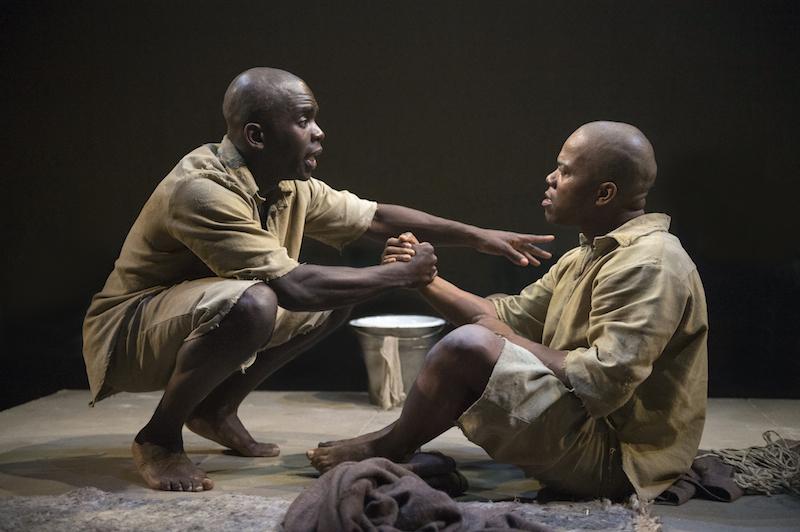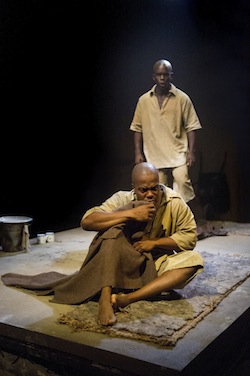The Island, Young Vic Theatre | reviews, news & interviews
The Island, Young Vic Theatre
The Island, Young Vic Theatre
A welcome return for John and Winston's Apartheid Antigone

This near-legendary short play, devised by Athol Fugard with the actors John Kani and Winston Ntshona (who gave their names to its characters), was first shown in Cape Town in 1973, during the apartheid era. Its effect then must have been electric, and some of that visceral intensity still shone out in one of the pair's last performances of the piece at the Old Vic in 2002.
But all this reminiscing is hardly fair. At the Young Vic, two experienced but much younger actors, Jimmy Akingbola and Daniel Poyser, are tackling the roles in a fortieth anniversary production and must banish all thought of their famous forebears. Theirs is a different task. Apartheid is no more, Nelson Mandela is free and Robben Island – the site of the prison which gives the play its title – is a tourist destination. And anyway, most of the Young Vic audience are probably too young to remember Kani and Ntshona. Has the play anything to say to Londoners now?
Winston has been condemned to life imprisonment for burning his pass book, the hated identification document all black South Africans were obliged to carry. John's sentence has been overturned on appeal and he will soon be released. They share a cell and know each other intimately, sometimes bickering like an old married couple, sometimes letting anger explode. But they have a strength which no-one can take away: their imagination. It is this which helps them to maintain their humanity, even to transport them, temporarily, out of their circumstances. In an early scene, John (Poyser) uses his tin mug as a stand-in phone and convincingly enjoys "hearing" and responding to replies from people back home in New Brighton, with Winston urgently attempting to join in.
 The plot, inspired by real events, is about the preparation of a performance of Antigone. Antigone's defying of the power of the state is obviously pertinent to their situation and Winston goes along, reluctantly at first, with John bossily persuading him into the part of Antigone. In a wig made of teased-out rope, tin mugs for "titties" and a blanket robe, he cuts a comic but ultimately strangely dignified figure.
The plot, inspired by real events, is about the preparation of a performance of Antigone. Antigone's defying of the power of the state is obviously pertinent to their situation and Winston goes along, reluctantly at first, with John bossily persuading him into the part of Antigone. In a wig made of teased-out rope, tin mugs for "titties" and a blanket robe, he cuts a comic but ultimately strangely dignified figure.
Alex Brown, winner of the JMK Award for young directors, makes the most of the actors' physical vigour and brings out the terrible contrast between their bantering friendship and their humiliation at the hands of bullying overseers. The effect of the first scene, in which John and Winston work out a punishment by pointlessly shifting piles of sand in silence, is somewhat dissipated, however, by the audience (who face each other either side of a raised stage in the Clare studio) entering and chatting. That long, relentless silence could be unbearable. And the final scene, in which Winston expresses his fury through the filter of Antigone would be even stronger with fewer knowing nods and winks from John.
But this is generally a taut, confident revival of a play which still has plenty to say, not only about friendship but about the possibility of holding on to dignity in the worst of circumstances. It is also, of course, about the liberating power of theatre.
rating
Explore topics
Share this article
The future of Arts Journalism
You can stop theartsdesk.com closing!
We urgently need financing to survive. Our fundraising drive has thus far raised £49,000 but we need to reach £100,000 or we will be forced to close. Please contribute here: https://gofund.me/c3f6033d
And if you can forward this information to anyone who might assist, we’d be grateful.

Subscribe to theartsdesk.com
Thank you for continuing to read our work on theartsdesk.com. For unlimited access to every article in its entirety, including our archive of more than 15,000 pieces, we're asking for £5 per month or £40 per year. We feel it's a very good deal, and hope you do too.
To take a subscription now simply click here.
And if you're looking for that extra gift for a friend or family member, why not treat them to a theartsdesk.com gift subscription?
more Theatre
 The Weir, Harold Pinter Theatre review - evasive fantasy, bleak truth and possible community
Three outstanding performances in Conor McPherson’s atmospheric five-hander
The Weir, Harold Pinter Theatre review - evasive fantasy, bleak truth and possible community
Three outstanding performances in Conor McPherson’s atmospheric five-hander
 Dracula, Lyric Hammersmith review - hit-and-miss recasting of the familiar story as feminist diatribe
Morgan Lloyd Malcolm's version puts Mina Harkness centre-stage
Dracula, Lyric Hammersmith review - hit-and-miss recasting of the familiar story as feminist diatribe
Morgan Lloyd Malcolm's version puts Mina Harkness centre-stage
 Reunion, Kiln Theatre review - a stormy night in every sense
Beautifully acted, but desperately grim drama
Reunion, Kiln Theatre review - a stormy night in every sense
Beautifully acted, but desperately grim drama
 The Code, Southwark Playhouse Elephant review - superbly cast, resonant play about the price of fame in Hollywood
Tracie Bennett is outstanding as a ribald, riotous Tallulah Bankhead
The Code, Southwark Playhouse Elephant review - superbly cast, resonant play about the price of fame in Hollywood
Tracie Bennett is outstanding as a ribald, riotous Tallulah Bankhead
 The Lady from the Sea, Bridge Theatre review - flashes of brilliance
Simon Stone refashions Ibsen in his own high-octane image
The Lady from the Sea, Bridge Theatre review - flashes of brilliance
Simon Stone refashions Ibsen in his own high-octane image
 Romans: A Novel, Almeida Theatre review - a uniquely extraordinary work
Alice Birch’s wildly epic family drama is both mind-blowing and exasperating
Romans: A Novel, Almeida Theatre review - a uniquely extraordinary work
Alice Birch’s wildly epic family drama is both mind-blowing and exasperating
 The Producers, Garrick Theatre review - Ve haf vays of making you laugh
You probably know what's coming, but it's such great fun!
The Producers, Garrick Theatre review - Ve haf vays of making you laugh
You probably know what's coming, but it's such great fun!
 Not Your Superwoman, Bush Theatre review - powerful tribute to the plight and perseverance of Black women
Golda Rosheuvel and Letitia Wright excel in a super new play
Not Your Superwoman, Bush Theatre review - powerful tribute to the plight and perseverance of Black women
Golda Rosheuvel and Letitia Wright excel in a super new play
 Cow | Deer, Royal Court review - paradox-rich account of non-human life
Experimental work about nature led by Katie Mitchell is both extraordinary and banal
Cow | Deer, Royal Court review - paradox-rich account of non-human life
Experimental work about nature led by Katie Mitchell is both extraordinary and banal
 Deaf Republic, Royal Court review - beautiful images, shame about the words
Staging of Ukrainian-American Ilya Kaminsky’s anti-war poems is too meta-theatrical
Deaf Republic, Royal Court review - beautiful images, shame about the words
Staging of Ukrainian-American Ilya Kaminsky’s anti-war poems is too meta-theatrical
 Laura Benanti: Nobody Cares, Underbelly Boulevard Soho review - Tony winner makes charming, cheeky London debut
Broadway's acclaimed Cinderella, Louise, and Amalia reaches Soho for a welcome one-night stand
Laura Benanti: Nobody Cares, Underbelly Boulevard Soho review - Tony winner makes charming, cheeky London debut
Broadway's acclaimed Cinderella, Louise, and Amalia reaches Soho for a welcome one-night stand
 The Pitchfork Disney, King's Head Theatre review - blazing with dark energy
Thrilling revival of Philip Ridley’s cult classic confirms its legendary status
The Pitchfork Disney, King's Head Theatre review - blazing with dark energy
Thrilling revival of Philip Ridley’s cult classic confirms its legendary status

Add comment